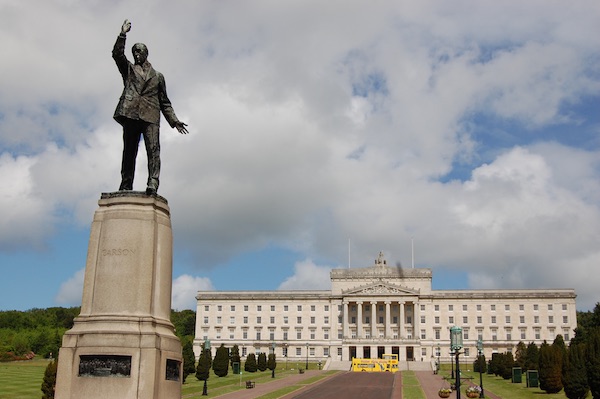
British Direct Ruler Karen Bradley has extended the shutdown of Stormont and creeping Direct Rule from London, already more than two years old, until August.
She said the decision to postpone an election to the Stormont Assembly was taken after “extensive engagement” with the north’s main parties. She indicated Assembly members would continue to receive their salary payments from the British exchequer.
During her appearance in the House of Commons, Mrs Bradley was also warned by the opposition that she risks becoming “part of the problem” in the north of Ireland after defying pressure to resign. Earlier this month, she told MPs in an incendiary statement that it is “not a crime” for British soldiers to kill Irish people, although she subsequently apologised for the remark.
Labour’s spokesperson on the north of Ireland, Tony Lloyd, challenged her on how she could carry on given the level of antipathy to her in Ireland. “If she is not part of the solution she becomes part of the problem,” the Labour MP said.
DUP deputy leader Nigel Dodds has also spoken out against the Direct Ruler, saying she had “not taken a grip and shown the leadership she should have”.
Meanwhile, Sinn Fein’s Michelle O’Neill said the British government’s reliance on the DUP was the single biggest impediment to the restoration of Stormont.
“Once again, the British government has shown that it is prepared to legislate when it suits the British government but refuses to act on issues like marriage equality, Acht Gaeilge (the Irish Language Act), the legacy bodies and compensation for victims of institutional abuse,” she said.
“Karen Bradley’s government is wholly reliant on the DUP in order to cling to power, and this toxic relationship, alongside Brexit, has become the biggest impediment to restoring the powersharing institutions on the basis of genuine equality and respect.”
Ms O’Neill added: “The DUP are at complete odds with the cross-community majority of MLAs and public here, who oppose their reckless Brexit agenda and their ongoing refusal to treat all citizens equally.
“Powersharing can and should be restored but that will require Karen Bradley’s government finally confronting the DUP’s discriminatory agenda and upholding their own responsibilities to citizens and the equality of treatment.”
The institutions crashed in January 2017 over a row about a corrupt green energy scheme, exposing long-standing differences between the two parties. Ms O’Neill said her party would not “negotiate down” from the proposals on the table when the last Stormont talks process collapsed in February 2018.
“The DUP walked away from that deal,” Mrs O’Neill said. “But the issues that caused the collapse remain, the issues in terms of the delivery of rights remain, we need to see those delivered in order for it to be successful.”
Ms O’Neill said: “What the DUP demonstrated last year was bad faith, what they did was to walk away from something that they themselves negotiated. We at a senior level at our party, along with the DUP, did negotiate a way forward, and the DUP chose not to sell that deal.
“They chose at the last minute to walk out and actually collapse the process, not even telling the people they were negotiating with.
“Actually the first port of call was the media, that’s not the way to conduct business, that’s not the way to conduct a negotiation.”
Ms O’Neill said her party was prepared to consider changes to the petition of concern, a veto mechanism used by the DUP to block political change but also valued by nationalists as a means for preventing unionists from abusing their built-in majority.
“We are not prepared to throw it in the bin,” she said. “It needs to be there. It needs to afford protections. But is there a way to reform it, of course we are open to looking at all of that. Remember it’s not the petition of concern that’s wrong, it’s the use of it that’s wrong.”
![[Irish Republican News]](https://republican-news.org/graphics/title_gifs/rn.gif)
![[Irish Republican News]](https://republican-news.org/graphics/title_gifs/harp.gif)

